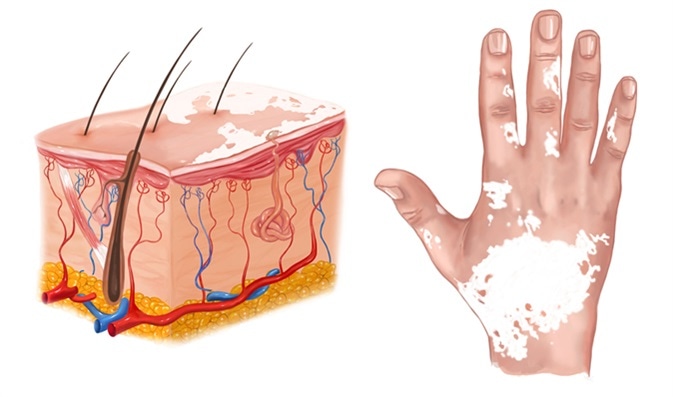Vitiligo is a skin disorder that manifests as white patches or discoloration on the skin. The condition usually develops before the age of 40, and it may occur around the eyes, mouth, hands, and legs. Mostly, it manifests at the age of 20.
The main cause of vitiligo is not yet known. Still, most studies claim that it develops due to the destruction of melanocytes (cells responsible for the production of melanin) that give skin its color.
Because vitiligo is an autoimmune condition, supplementation or a diet that is rich in vitamin B12 and folic acid can help improve the condition. Let us discuss how these two essential nutrients can affect vitiligo.

Vitamin B12 and Folic Acid Deficiency
Vitamin B12 is vital in DNA synthesis, and its deficiency in the body is associated with vitiligo. In several studies, skin conditions such as vitiligo were most common in individuals with a deficiency in vitamin B12.
For someone to develop Vitamin B12 deficiency, it takes up to 5 years of suboptimal intake. Signs and symptoms of vitamin B12 deficiency include feeling weak and tired, smooth tongue, pale skin, gas, constipation, diarrhea, lack of appetite, muscle weakness, numbness, and shortness of breath.
Several studies have also reported that vitiligo patients tend to have lower levels folic acid compared to persons without vitiligo. Also, the patients had high levels of ROS (reactive oxygen species) that affect the production of melanocytes that eventually cause depigmentation.
Since Vitamin B12 is essential in the production of skin pigments, it could be an effective way to treat vitiligo. Numerous studies have shown a productive relationship between vitamin B12 and pigmentation in the body.
In fact, recommendations have been made by doctors to vitiligo patients to use vitamin B12 supplements to manage vitiligo symptoms under the direct supervision of medical personnel. Combining vitamin B12 and folic acid as a regimen for the treatment of vitiligo has high chances of success, especially when these are used alongside a healthy diet.
Vitamin B12 and Folic Acid for Vitiligo
In treating vitiligo, doctors have been prescribing a combination of vitamins to promote re-pigmentation. These vitamins include B12, D, E, C, and folic acid because they play a significant role in ensuring healthy skin.
In the body, vitamin B12 limits the production of homocysteine; the latter downregulates tyrosinase activity (an enzyme responsible for the production of melanin) and also triggers the production of free radicals, leading to impaired synthesis of melanin and melanocytes destruction. Therefore, limiting the production of homocysteine is indeed desirable. Folic acid acts as a booster for vitamin B12, that is, as a methyl group donor.
Using vitamin B12 and folic acid to treat vitiligo is one of the most effective treatment regimens. Studies have shown that vitamin B12 and folic acid combination followed by sun exposure works to regain natural skin color over a period of time.
Most doctors recommend taking higher than average doses of oral folic acid and oral vitamin B12 on a daily basis to manage vitiligo.
Vitamin B12 and Folic Acid Dietary Recommendations
Individuals suffering from vitiligo are also advised to consider taking foods rich in folic acid and vitamin B12 to boost their body defense against vitiligo and other skin conditions. Natural sources of folic acid include:
- Liver
- Broccoli
- Peas
- Chickpea
- Brown rice
- Fortified cereals
- Spinach and
- Asparagus.
Vitamin B12 is helpful in processing folic acid in the body. Some of the best sources of vitamin B12 include:
- Meat
- Salmon
- Milk
- Cod oil
- Eggs
- Cheese and
- Fortified cereals.
Because folic acid is not stored in the body, people with vitiligo need to consume these foods daily (or use a supplement).
Note
Before using folic acid and vitamin B12, it is vital to consult your doctor for proper dosage and usage guidelines.
